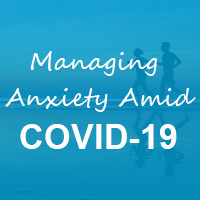Posted By Lauren Brawley On May 4, 2020
Managing Anxiety Amid COVID-19

Amid the COVID-19 pandemic, there is a lot of noise flooding our daily lives. As cases of COVID-19 continue to increase, so do cases of anxiety and worry. Everyone in the world has been indirectly or directly affected by this virus. It’s no secret by now COVID-19 has a far greater impact than just those who are diagnosed. The way our world lives and works has been altered in the past couple of months. The Kaiser Family Foundation reported in late April over half of U.S. adults (56%) COVID-19 stress or worry has had a negative impact on their mental health.
Now, possibly more than ever, the topic of mental health is growing in our country. Mental health literacy is gaining momentum in the United States media. A recent PsychU Webinar noted the loneliness epidemic was already prevalent in our culture. COVID-19 is helping the world to recognize this epidemic and increase resources available online to uplift people. Additionally, behavioral health professionals anticipate a reduced mental health stigma at the end of this pandemic. COVID-19 may result in greater overall recognition of behavioral health professionals.
During this pandemic, individuals and practicing healthcare professionals alike, need reminders of ways to cope with anxiety and stress. Mental well being is just as important as your physical well being, especially during a time of crisis.
Tips for Managing Anxiety During COVID-19
Changing the Narrative
Instead of social distancing, think of physically distancing yourself with an enhancement of socially connecting. Shift the mindset of social distancing to physical distancing with an enhancement of social connection. Know what types of virtual social connections work best for you. Then, take time to incorporate appropriate social connections into your routine. For some, it may be calling a friend once a day or setting up a video call with friends each week. Whatever outlet you choose, connection with others is still vital during this time.
Take Note and Take Action
When worry begins turning into anxiety, take note and take action. When worry shows up frequently and with an intensity, it may be time to take action. Take a trusted mental health screening online. MHAscreening.org, for example, is an evidence-based technology and will transfer you to resources specific to screening results. When mental health is taking a toll on your everyday life, get connected to resources available to you. SAMHSA, additionally, has a free and confidential National Helpline for treatment referral and information services. The number is 1-800-662-HELP (4357).
Avoid Anxiety Triggers
Recognize the outlets increasing your specific worry and anxiety. For example, it may be beneficial to limit screen and news intake. Make sure to stay informed and get the facts you need, but avoid media known to fabricate stories and bring on unnecessary worry.
Take Control of What You Can
There are certain aspects of life we can take control of. Some parts of life and this virus are completely out of our control. Control the things you can each day and let go of the things you cannot control. Ask yourself: what is in my control today and what is out of my control?
Here are some additional articles for tips on managing anxiety during COVID-19:
- https://thriveglobal.com/stories/coronavirus-crisis-toll-on-mental-health-solutions/
- https://www.cdc.gov/coronavirus/2019-ncov/daily-life-coping/managing-stress-anxiety.html
- https://thriveglobal.com/stories/how-to-reframe-negative-mindset-shift-perspective-stress-tips/?utm_source=Newsletter_General&utm_medium=Thrive
Specifically for Physicians
Our healthcare heroes are specifically in need of support. The physicians on the frontline of this pandemic are likely to have many fears, pressures, and anxieties. A Philadelphia-based psychiatrist recently launched the Physician Support Line, to serve as “emotional personal protective equipment (PPE)” for physicians who may need it. Over 600 psychiatrists across the country volunteer to take shifts for the support line to be open each day from 8:00 AM to 12:00 AM EST.
Know the Resources Available
Patagonia Health Resource Page
This pandemic will pass. In the meantime, know there are many resources available for you. COVID-19 will offer our world more tools to combat mental illness. Additionally, this time in history will show the importance of being proactive about physical and mental health. Remain hopeful, stay connected to those around you, and don’t be afraid to ask for help. As a Behavioral and Public Health EHR, we are here for you. We understand the hardships healthcare professionals are facing during these difficult times. If there is any way we can support you, please contact us today.